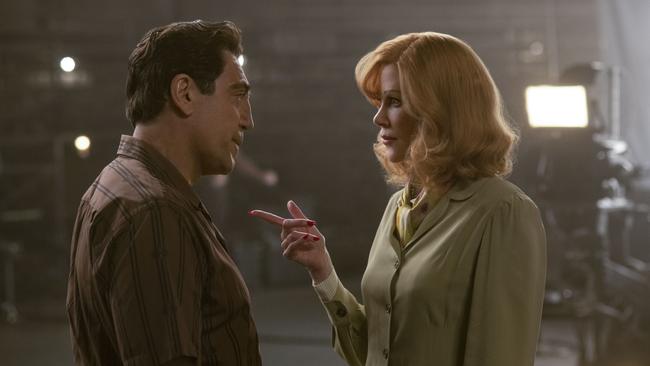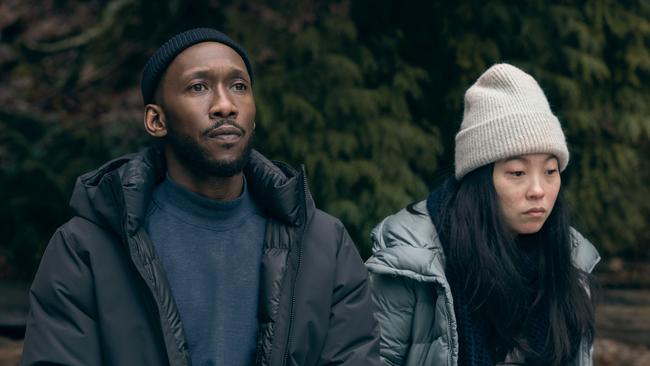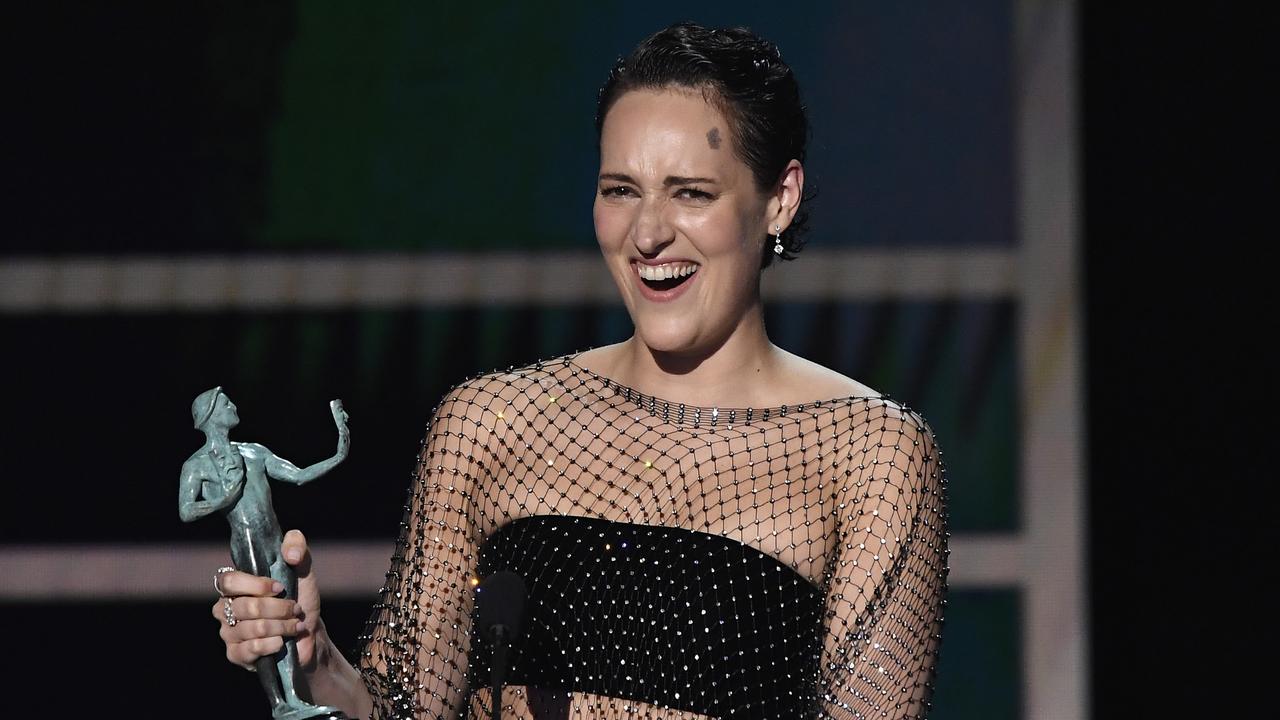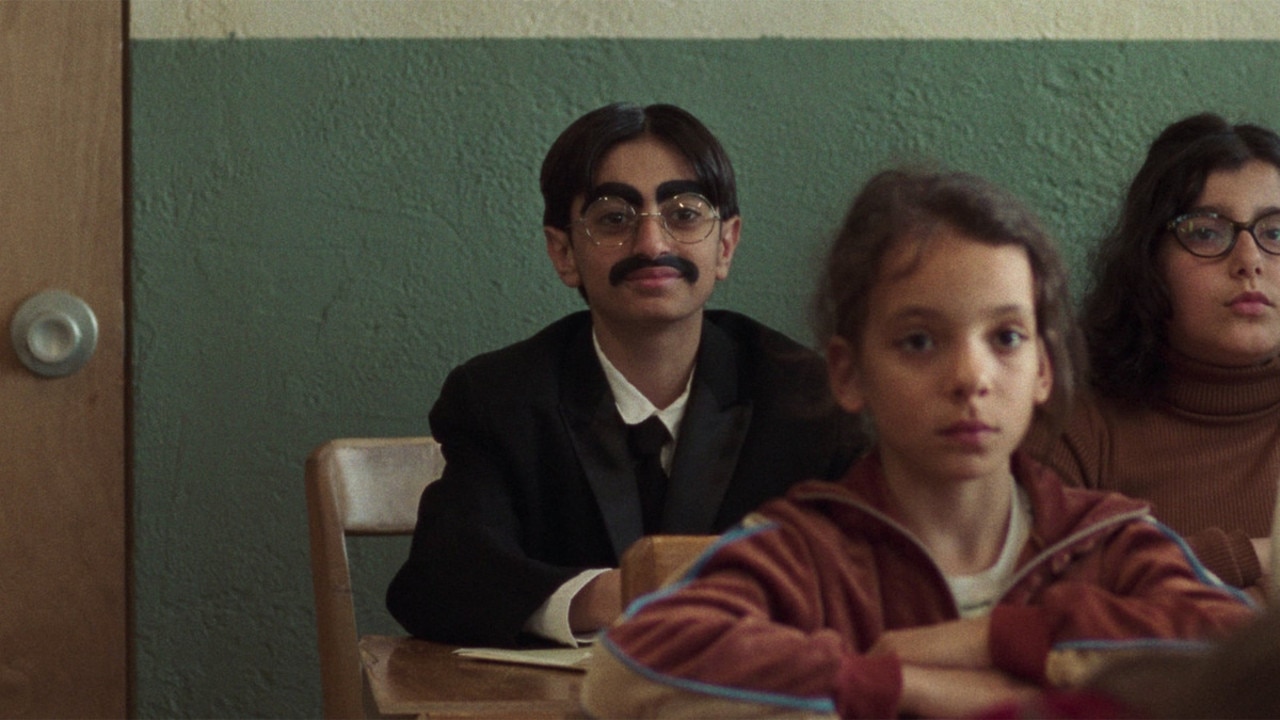Bets on Kidman’s second Oscar
Nicole Kidman gives a wonderfully out-sized performance as the larger-than-life Lucille Ball in Aaron Sorkin’s passionate biographical drama Being the Ricardos.

Being the Ricardos (M)
Amazon Prime from December 21
★★★★½
Nicole Kidman might well win her second Oscar for her out-sized performance as the larger-than-life Lucille Ball in Aaron Sorkin’s passionate biographical drama Being the Ricardos.
In one of the swings and roundabouts moments that characterise Hollywood, Kidman’s Oscar-winning compatriot Cate Blanchett was first cast in the role, but pulled out.
Kidman is the sharp-minded, fierce-tongued near-perfectionist Ball and another Oscar winner, Javier Bardem, is her handsome, man-of-the world, Cuban-born husband Desi Arnaz.
Ball and Arnaz starred as husband and wife in the hit American television comedy I Love Lucy, which ran from 1951-57, the early days of the small screen. (The title refers to their on-screen names, Lucy and Ricky Ricardo.)
This 131-minute film unfolds over one week in September 1952 as the cast, show creator, director and writers make one episode of a half-hour comedy watched by 60m people.
In tandem with this there are moments from the past, showing Lucy’s time in Hollywood, and the future, including fictional present-day interviews with people who worked on the show.
Underneath it all is a blazing tribute to one woman’s artistic will and comic genius. “I’m Lucille Ball,’’ she says when a suit asks if she’s trying to be funny. “When I’m being funny you’ll know it.”
The behind-the-scenes dissection of the making of one episode – from the writer’s room (a space Sorkin knows intimately) to the rehearsals – are fascinating. Ball becomes obsessed with one scene, one she thinks insults the intelligence of the viewers.
Sorkin uses black-and-white to show scenes from the show as Ball imagines them, and then as they are filmed. This is so much more interesting than just using clips from the actual show. The Italian grape stomping scene is worth waiting for.
The writer-director merges three important moments in Lucy and Desi’s life into this one week and in doing so takes the film to another level, one that rides the sweep of history.
First, radio newsman Walter Winchell reports that Ball has an affiliation with the Communist Party. It is the McCarthy era and, if true, this is something intolerable to the studio, CBS, and the sponsor, tobacco firm Philip Morris.
Second, a magazine runs photographs of Arnaz, the charismatic nightclub singer, with another woman. As Ball notes when asked if she has problems at home, “My problem’s not at home that much.”
Third, Arnaz is home enough for his wife to fall pregnant, which is perhaps even worse than being a communist. Neither CBS or Philip Morris will countenance using the word “pregnant” in the show, let alone show an expectant woman. The fraught discussions over this take us right into the Me Too era.
This is such an Aaron Sorkin film, brimming with the intelligence and whiplash dialogue that has distinguished his career since the White House drama The West Wing.
He has the actors to pull it off. Kidman and Bardem are utterly in sync as the extroverted couple who, as one of the writers recalls, are “either tearing each other’s heads off or tearing each other’s clothes off”.
JK Simmons, another Oscar winner, is William Frawley, the vaudevillian actor who played Fred Mertz, neighbour to the Ricardos. When, concerned for Ball, he suggests they go for a drink, she tells him it’s only 10am. His response wins my vote for line of the film: “I’m sure it’s 10.15 somewhere.”
Nina Arianda is compelling as Vivian Vance, the actress not as pretty as Ball who played Mrs Ethel Mertz, as is Alia Shawkat as Madelyn Pugh, the only female writer on the show.
This movie has memorable scenes throughout, though it’s one towards the end that is perhaps the most mesmerising, where Arnaz, chased from Cuba by the communists, telephones someone, in front of a studio audience, for a verdict on his wife and the red menace.
It’s also a scene that will send viewers down online rabbit holes to find out how much of the film is true. I saw it a few days ago and I’m still in one.
Last year Aaron Sorkin made The Trial of the Chicago Seven, which is in my top 20 films of 2020. This year, he has made one of the top five.
-
Swan Song (M)
Apple TV+
★★★★
Mahershala Ali is an outstanding actor. At 47, he has two Oscars, for Barry Jenkins’s Moonlighting (2016) and Peter Farrelly’s Green Book (2018). Fans score a double treat in the near-future drama-thriller Swan Song, as he has two roles.
The twist is this is not like David Cronenberg’s Dead Ringers (1988) or Peter Medak’s The Krays (1990), where Jeremy Irons and Tom Hardy respectively do overtime as twin brothers.
Ali’s characters are Cameron Turner and a clone of Cameron Turner. Yet this absorbing, thought-provoking 111-minute movie, written and directed by Irish filmmaker Benjamin Cleary, is not about replicants in the Blade Runner sense.
Cameron, a commercial artist, is dying of cancer. He has not told his pregnant wife, Poppy (Noamie Harris, who worked with Ali on Moonlighting), or their young son.
The person he has told is the doctor (Glenn Close) who runs an experimental lab in which people with a terminal illness can have a duplicate of themselves made, one free of the disease and the DNA that might cause it.
This doppelganger, who is called Jack in the lab, is not just a lookalike. A six-hour memory transfer means he has the same memories as Cameron, from birth onwards. He is Cameron, “down to the last molecule”.
There is a two-week trial period in which the duplicate assumes the original’s life: lives in his house, sleeps with his wife, plays with his kid, does his job.
At this point the duplicate and the original, who is able to watch via a live feed, know exactly who they are.
“I know you don’t think I am you,’’ the duplicate tells him, sympathetically.
However, if the original signs off on the replacement, then the duplicate’s memory of the two weeks are erased. He will then be the original and will have no thoughts to the contrary.
The original will remain at the lab until he dies. His memory is not erased. He knows he’s been replaced. The choice is to make this personal sacrifice so his family’s life will continue.
His wife will still have her husband, his kids will still have their father. As far as they know, nothing has changed. “It’s a clean swap,’’ the doctor tells him. She believes the treatment “will be as common as a heart transplant in a few years”.
If Cameron agrees to proceed he will be only the third patient to date. He meets the still-living second patient, Kate (Awkwafina), at the lab, and then meets her duplicate out in the world, looking after her daughter.
On his return he asks Kate how long it’s been since the duplicate took over. “Forty-two days and six hours,” she replies.
This dynamic between replacing a dying original with a healthy, undetectable duplicate sets up intriguing questions.

This is a psychological drama in one man’s two heads. The camerawork and film editing are close to flawless. In scene after scene, two Mahershala Alis are in shot.
During the memory transfer the doctor tells Cameron it will include all his memories, even the ones he has buried in his deep subconscious.
That sets up interesting possibilities.
There’s a superb scene where Cameron and his duplicate almost have a fist fight, as though his different selves, the selfish Cameron and the sensitive Cameron are telling each other home truths. Ali is brilliant throughout, showing how we all are people of many parts, some of them better than others.
The other huge question centres on that “down to the last molecule” claim. Is the duplicate 100 per cent Cameron, past present and future, or is he something else? And is he truly undetectable or will some wrinkle reveal he is a clone? There’s a telling, humorous scene where he meets the family dog.
There’s a back flash moment in which Cameron, Poppy and her twin brother are having a general chat about the duplicate program.
“You’d know it wasn’t the real person in seconds,” Poppy decides.
“You can’t copy a human being. You can’t.”
Whether she is right about that is something that might be put to the test in our own near future. As the doctor says when Cameron expresses surprise that only three people work in the lab, “our AI systems do the work of about 50 people”.




To join the conversation, please log in. Don't have an account? Register
Join the conversation, you are commenting as Logout